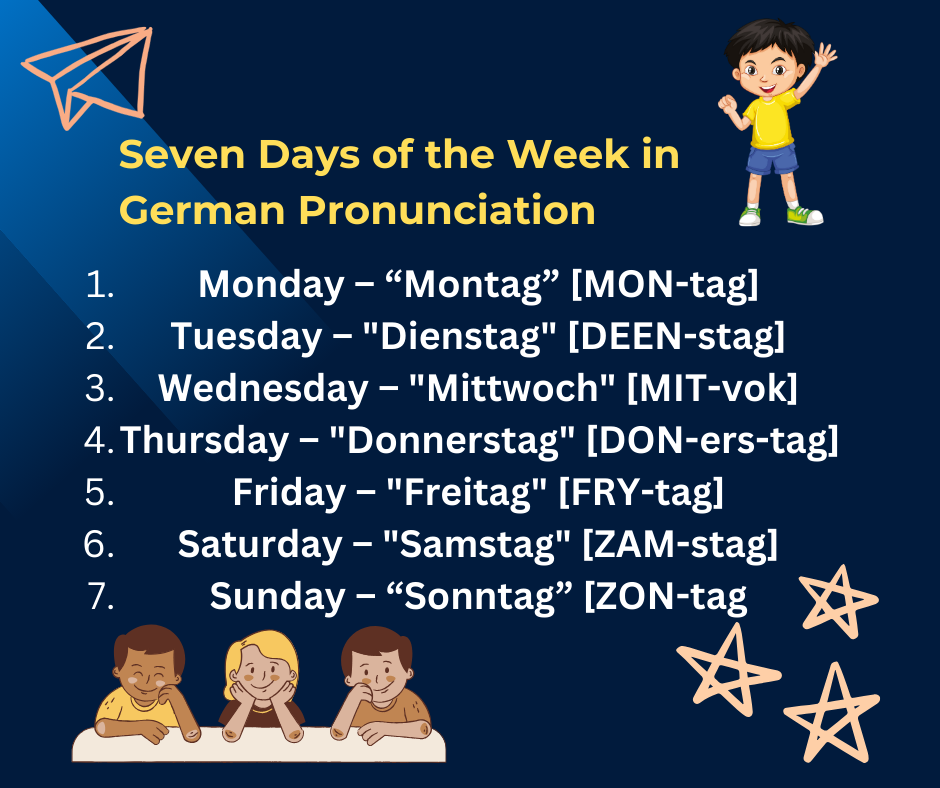Learning German is an exciting endeavor with countless rewards. One of the initial and crucial steps in this process is understanding the days of the week in German.
These fundamental words serve as building blocks, facilitating effective communication for making plans, setting up meetings, and organizing your schedule.
Mastering the Wochentage (days of the week) isn’t just about linguistic proficiency; it’s about gaining practical skills that influence your daily life. Whether you’re coordinating social events, planning work commitments, or simply navigating through time, these are seven essential words.
So, let’s take that crucial first step together and familiarize ourselves with the weekdays in German.

Is Learning Days of the Week in German Difficult?
Learning the Wochentage (days of the week) in German is a breeze! It might be a surprise to note that the days of the week in German pronunciation are relatively easy. Here’s why:
German Days of the Week Sounds Similar to its English Counterparts
Many German days of the week sound like their English counterparts. Montag (Monday) and Dienstag (Tuesday) practically chime in together, while Donnerstag (Thursday) and Freitag (Friday) share a familiar rhythm.
Words have Repeated Patterns
Most German days of the week wear a common hat – the suffix “-tag,” meaning “day.” This repeating pattern provides a built-in memory trick. Once you learn Montag-tag, the others fall into line almost magically!
So, fear not! Conquering the days of the week in German is easier than you think. Don’t be surprised if you say “Sonntag” with a smile before long!
Seven Days of the Week in German Pronunciation
Let’s kick off with the basics – the German days of the week and their pronunciations:
- Monday – “Montag” [MON-tag]
- Tuesday – “Dienstag” [DEEN-stag]
- Wednesday – “Mittwoch” [MIT-vok]
- Thursday – “Donnerstag” [DON-ers-tag]
- Friday – “Freitag” [FRY-tag]
- Saturday – “Samstag” [ZAM-stag]
- Sunday – “Sonntag” [ZON-tag]
Now, here’s the fun part: just like in English, where days end with -day, almost all German days end with -tag. Easy, right?

Days of the Week in German: Origins and Meaning
Let’s uncover the fascinating roots behind each German day of the week:
- Montag (Monday): In German, “Mond” means moon, so Monday, or “Montag,” literally translates to “moon day.”
- Dienstag (Tuesday): Dienstag finds its roots in the German name for Tyr, the god of war. A nod to strength and might.
- Mittwoch (Wednesday): Unlike others, Mittwoch doesn’t end with -tag. The literal translation is “mitt” for “mid” and “Woch” for “week,” giving us “midweek.”
- Donnerstag (Thursday): Named after Donner, the German name for Thor, the god of thunder, akin to the English “Thursday.”
- Freitag (Friday): The “Frei” in “Freitag” refers to the goddess of marriage and motherhood. In English, it echoes the adaptation of the Norse name “Fri.”
- Samstag (Saturday): “Samstag” is the German word for Sabbath, signifying a day of rest and reflection.
- Sonntag (Sunday): “Sonntag” means “day of the sun,” aligning with the English “Sunday” and its association with the sun.
Each day tells a story, weaving together language, mythology, and cultural roots.
Learning Days of the Week in German: Tips and Tactics
Unlocking the German days of the week may seem formidable, but with some clever strategies, you’ll have them at your fingertips in no time.
Here are some tips and tactics to make the process both effective and enjoyable:
Have Fun
Infuse fun into your learning by associating each day with a unique celebration. For instance, try singing a catchy song related to a specific day.
Use Post-It’s
Stick Post-It notes with the German names of the days on items you use on those specific days. It could be as quirky as attaching “Montag,” “Mittwoch,” and “Donnerstag” to your exercise bands or reserving “Samstag” for your favorite bottle of wine.
Switch Your Calendars to German
Take your learning to the next level by switching your phone or computer calendars to German. This daily exposure to the German days will enhance your familiarity and make it second nature.
Mnemonics
Make learning the German days of the week a breeze with a nifty trick – use mnemonics! It’s like creating secret codes to remember stuff. With this clever hack, you’ll find that remembering the German days becomes way easier and more fun. Give it a try, and you’ll be a Wochentage pro in no time.
“Dienstag” & “Donnerstag”
If you find yourself stumbling between “Dienstag” and “Donnerstag,” remember that “Dienstag” is shorter. Use this visual cue to place “Dienstag” before “Donnerstag” in your mental weekday lineup.
With these practical tips, mastering the German days of the week becomes an adventure rather than a challenge. So, dive in, embrace the quirks, and soon, you’ll effortlessly learn the days of the week in German.

Common Mistakes to Avoid
When learning to pronounce the days of the week in German, avoiding common mistakes is essential to ensure accurate pronunciation.
Here are some tips to avoid them:
- Pay attention to the correct vowel sounds and stress in each word. For example, “Dienstag” is pronounced as “deens-tahk” and “Donnerstag” as “don-ers-tahk”.
- Be mindful of the pronunciation of consonants, such as the “ch” sound in “Mittwoch,” which is pronounced as “mit-vock.”
- Remember that all days of the week in German are masculine and should be capitalized. For example, “Montag” means Monday and is pronounced as “mohn-tahk.”
By paying attention to these details, you can improve your pronunciation of the days of the week in German and avoid common mistakes.
Takeaway
Learning the days of the week in German is an enjoyable journey with plenty of helpful resources.
It is a vital step in your language journey. Embrace the phonetic guide, practice confidently, and soon you’ll be effortlessly rolling off the Wochentage like a native speaker.
The good news is that dedicating approximately 30-40 minutes to memorizing the words, grasping the spelling intricacies, and honing pronunciation skills is a feasible commitment.
However, consistent practice is the crucial element to solidify this knowledge in your memory.
Approach the learning process with focus and dedication, and in no time, you’ll effortlessly navigate the German days of the week. Excellence comes with practice!


 February 20, 2024
February 20, 2024  6 Min
6 Min  No Comment
No Comment 



